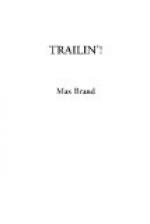There was a click as the lock was tried.
“Locked, damn it!”
“Shut up, Butch. Jerry, have you got a bar, or anything? We’ll pry it down and break in on him before he can get in action.”
“You’re a fool, McNamara. That feller don’t take a wink to get into action. Sure he didn’t hear you when you hollered out the window? That was a fool move, Wood.”
“I don’t think he heard. There wasn’t any sound from his room when I passed it goin’ downstairs. Think of the nerve of this bird comin’ here to roost after what he done.”
“He didn’t think we’d follow him so fast.”
But Anthony waited for no more. He slipped out on the roof of the shed, lowered himself hand below hand to the edge, and dropped lightly to the ground.
The grey, at his coming, flattened back its ears, as though it knew that more hard work was coming, but he saddled rapidly, led it outside, and rode a short distance into the forest. There he stopped.
His course lay due north, and then a swerve to the side and a straight course west for the ranch of William Drew. If the hounds of the law were so close on his trace, they certainly would never suspect him of doubling back in this manner, and he would have the rancher to himself when he arrived.
Yet still he did not start the grey forward to the north. For to the south lay Sally Fortune, and at the thought of her a singular hollowness came about his heart, a loneliness, not for himself, but for her. Yes, in a strange way all self was blotted from his emotion.
It would be a surrender to turn back—now.
And like a defeated man who rides in a lost cause, he swung the grey to the south and rode back over the trail, his head bowed.
CHAPTER XXXVII
“TODO ES PERDO”
It was not long after the departure of Bard that Sally Fortune awoke. For a step had creaked on the floor, and she looked up to find Steve Nash standing in the centre of the room with the firelight gloomily about him; behind, blocking the door with his squat figure, stood Shorty Kilrain.
“Where’s your side-kicker?” asked Nash. “Where’s Bard?”
And looking across the room, she saw that the other bunk was empty. She raised her arms quickly, as if to stifle a yawn, and sat up in the bunk, holding the blanket close about her shoulders. The face she showed to Nash was calmly contemptuous.
“The bird seems to be flown, eh?” she queried.
“Where is he?” he repeated, and made a step nearer.
She knew at last that her power over him as a woman was gone; she caught the danger of his tone, saw it in the steadiness of the eyes he fixed upon her. Behind was a great, vague feeling of loss, the old hollowness about the heart. It made her reckless of consequences; and when Nash asked, “Is he hangin’ around behind the corner, maybe?” she cried:




